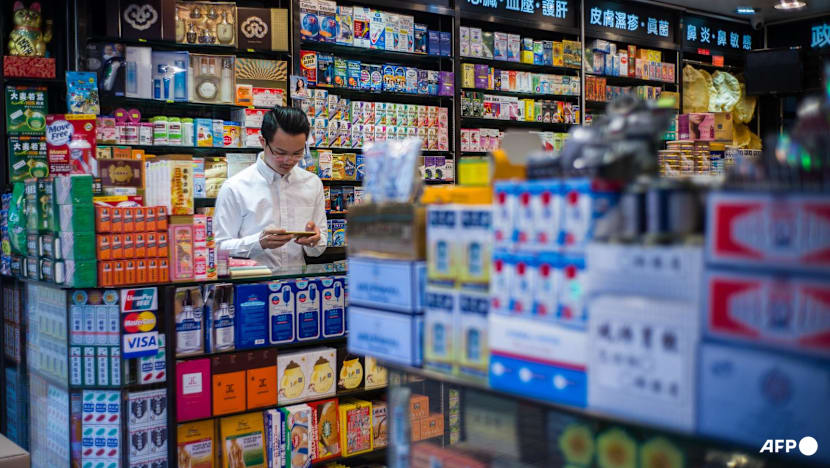Singaporean tourist’s US$3,900 herb bill exposes 'unscrupulous' tactics in Hong Kong pharmacies
“These malpractices not only damage the reputation of Hong Kong’s retail and tourism industries, but also undermine tourists’ confidence,” says the Hong Kong Consumer Council.

In this picture taken on Sep 22, 2016, a salesman uses his phone in a Chinese and western pharmacy in Hong Kong. (Photo: AFP/Anthony Wallace)

This audio is generated by an AI tool.
HONG KONG: A Singaporean tourist was misled into paying a staggering HK$30,400 (US$3,908) for herbs at a Hong Kong pharmacy, a case among hundreds of complaints highlighting ongoing concerns over “unscrupulous sales practices” in local pharmacies and medicine shops.
In a statement on Monday (Sep 15), the Hong Kong Consumer Council said it received 548 complaints between January and August this year - over malpractice by local pharmacies.
The figure was slightly lower than the 556 cases reported in the same period last year, the council added.
Among the cases was an incident involving a female Singaporean tourist, who had been charged 100 times the labelled price for herbs at a medicine shop.
The woman had visited the medicine shop with her family to buy facial cleansers, according to the Hong Kong Consumer Council statement.
A salesperson “persistently promoted” herbs like milk thistle, often used as a liver supplement, and even offered a ‘buy 80 get 5 free’ deal”, it said.
The weight of the herbs measured on the scale was displayed as 0.85, and “the pricing unit of measurement was never mentioned throughout the sales process”, the council added.
Claiming the label displayed HK$380 per “tael”, the woman estimated the price to be around HK$300, and agreed to the purchase.
But after the herbs were ground into powder, she was presented with a bill for HK$30,400.
“Startled by the unexpectedly exorbitant price, she immediately questioned the amount, only to be told that the pricing unit was ‘mace’ instead of ‘tael’,” the council said.
In Hong Kong, 1 mace is equivalent to 3.78 g while tael is a commonly used Chinese measurement equal to 37.8 g.
Despite the exorbitant price and lack of clear explanation, the woman chose to settle the payment as she was accompanied by her three children and did not want to dispute the matter at the store, the council said.
The shop insisted that its price label clearly showed “mace” as the unit, but neither party could produce photo evidence.
It initially offered a partial refund of HK$21,280, without requiring the herbs to be returned, but the tourist declined.
After repeated mediation by the Council, the shop “ultimately agreed to issue a full refund upon return of the product, thereby resolving the case”.
CALL FOR INDUSTRY INTEGRITY
Apart from ambiguous pricing units often involving traditional Chinese measurement systems unfamiliar to tourists, other common complaints include imitation products and misleading packaging, the council said.
“These malpractices not only damage the reputation of Hong Kong’s retail and tourism industries, but also undermine tourists’ confidence in shopping across the city,” it added.
The Hong Kong Consumer Council urged pharmacies and local medicine shops to "prominently display” pricing units for goods like Chinese herbal medicine and dried seafood.
Information should also be clearly explained before a transaction is completed.
“Traders must also ensure that transaction details on receipts are accurate, as such documentation serves as decisive evidence in resolving consumer disputes,” the council said.
“The Council strongly urges the industry to abandon misleading sales tactics, uphold integrity in business practices, and strengthen self-discipline so that through joint efforts, Hong Kong’s reputation as a shoppers’ paradise can be safeguarded.”
Consumers are also reminded to check measurement units, clarify total costs and inspect receipts to ensure that product names and quantities match.
“Consumers are advised to patronise reputable traders. They may also look for the ‘No Fakes’ pledge sticker displayed at the store entrance and check that the year indicated is current, as each sticker is valid for one year,” the council said.















